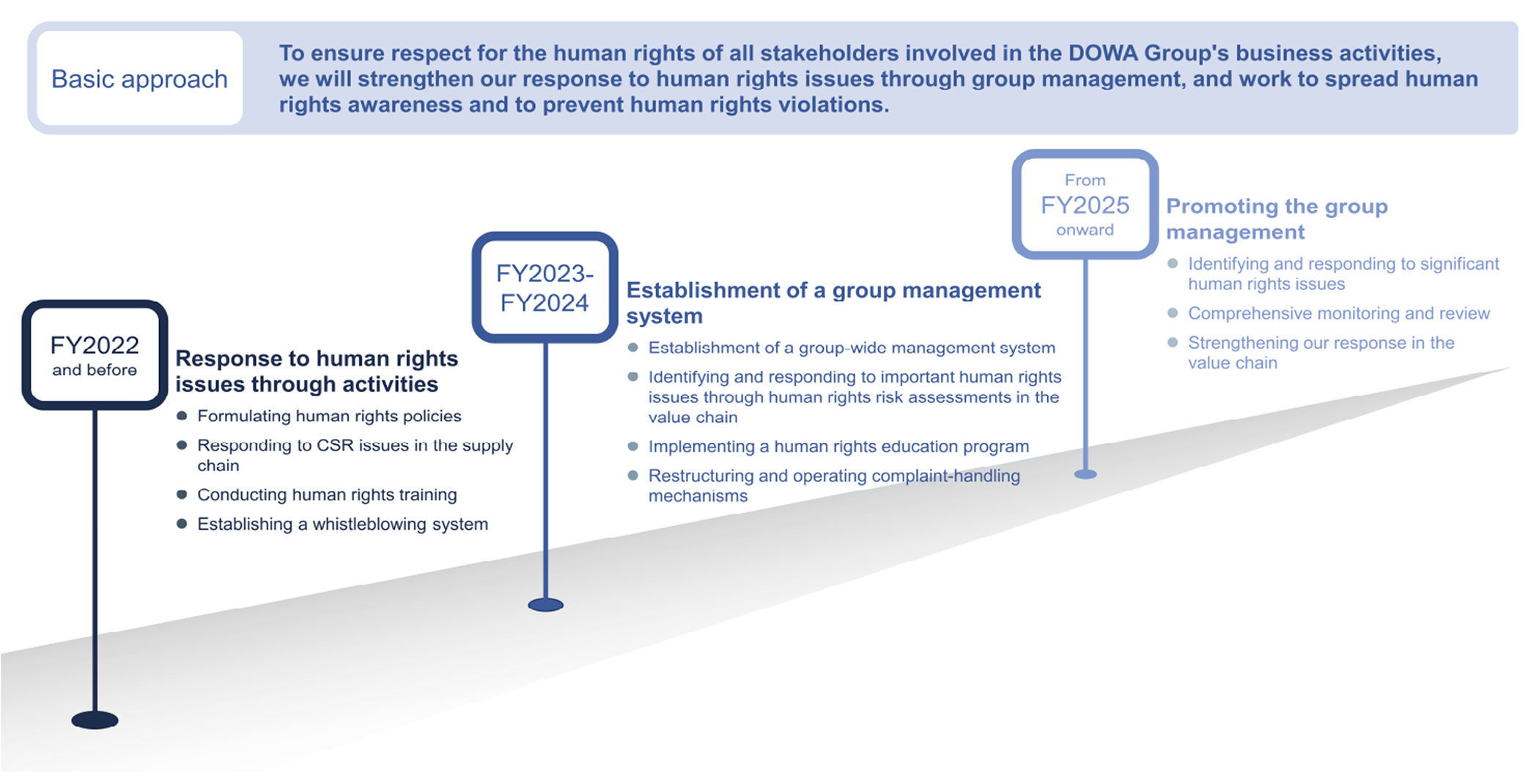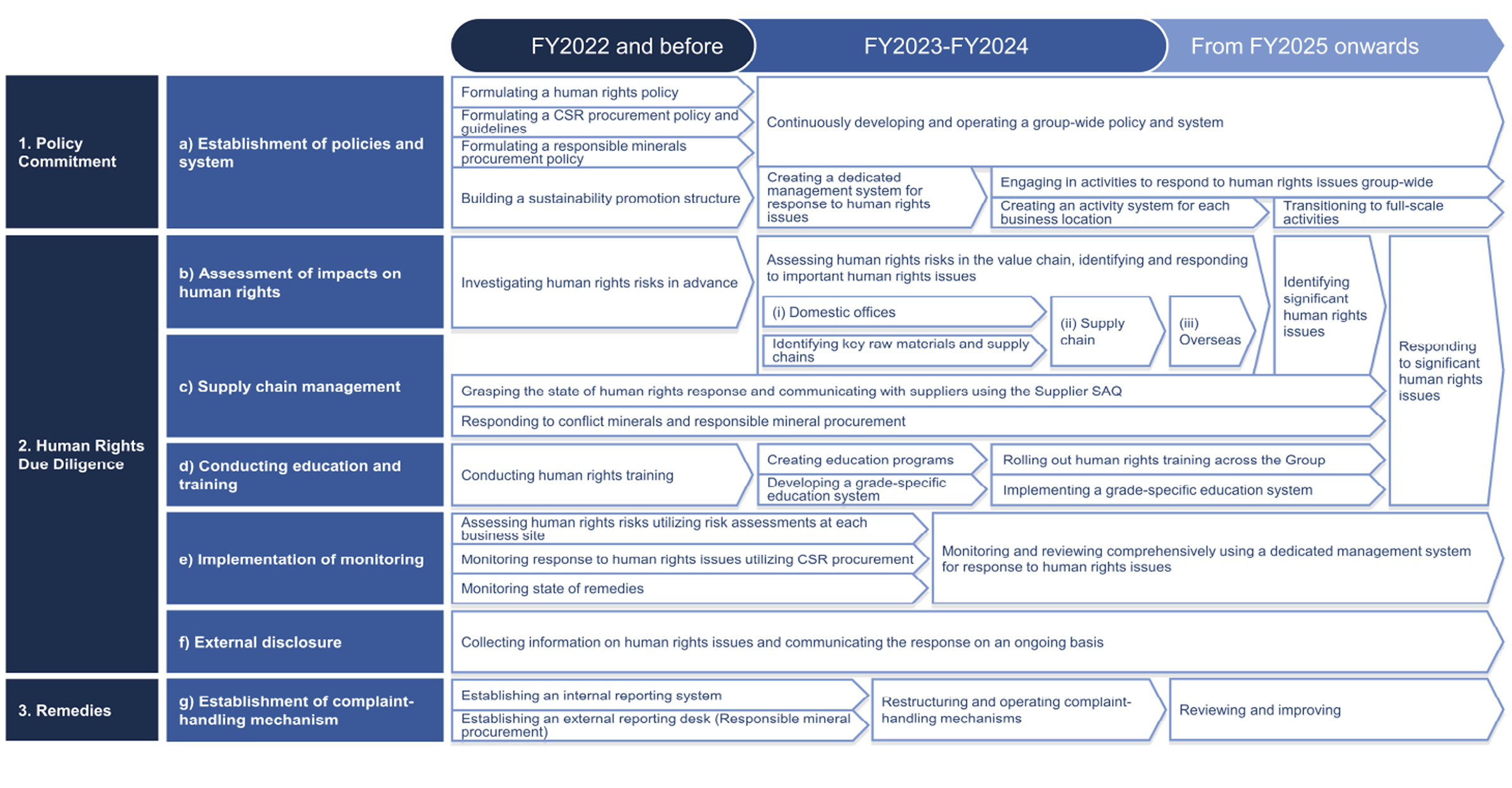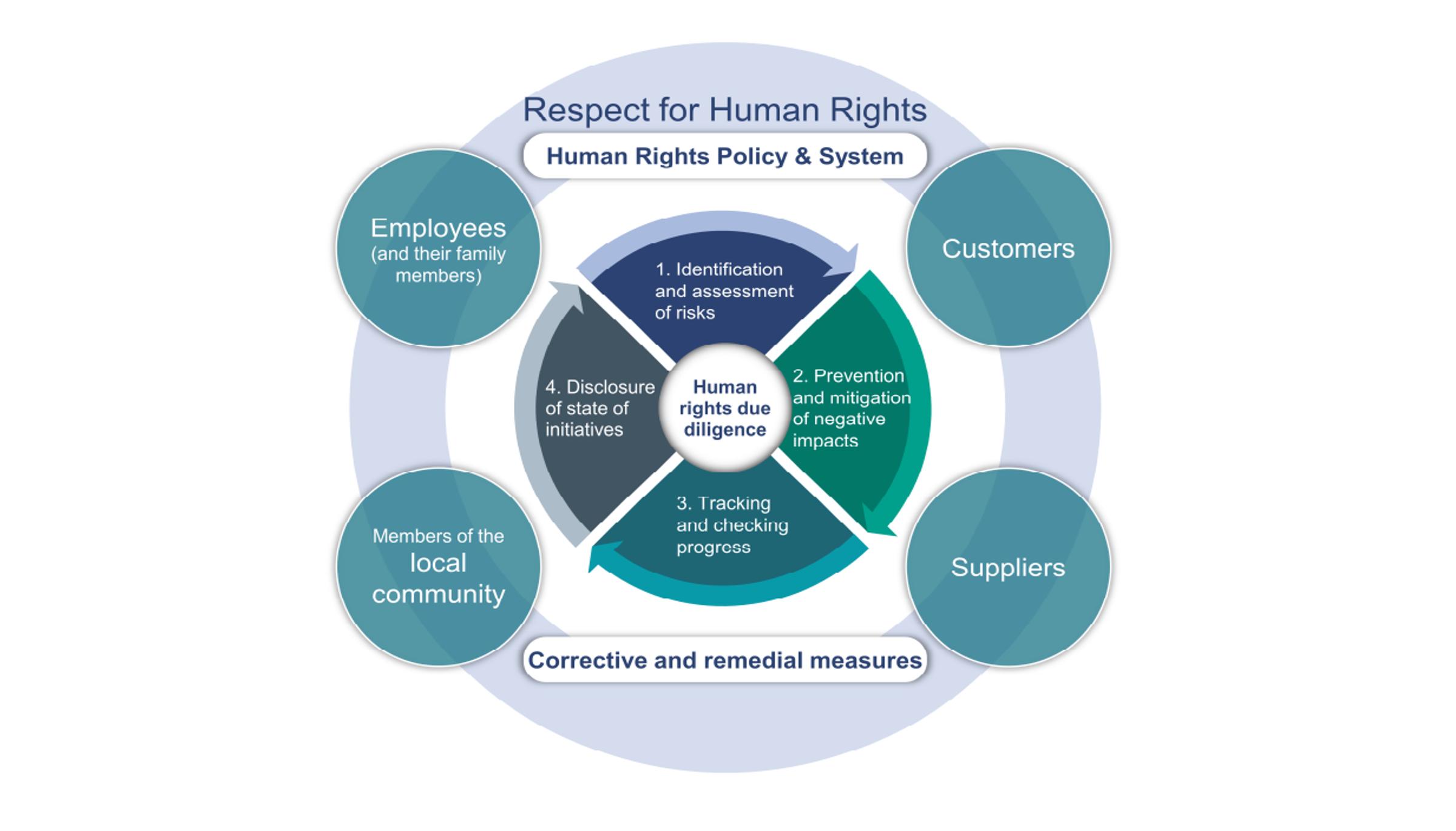The DOWA Group respects the human rights of all stakeholders involved in the Group’s business activities, we will strengthen our response to human rights issues through group management, and work to spread awareness of human rights and prevent human rights violations. Respect for human rights is the foundation for creating a prosperous society for people, and is one of our most important initiatives and indispensable to our corporate activities. In March 2022, we established the DOWA Group Human Rights Policy—based on the UN Guiding Principles on Business and Human Rights established by the United Nations—to fulfill our responsibility to respect human rights, as required of all companies.
The human rights policy clearly supports “International Bill of Human Rights” (Universal Declaration of Human Rights and International Covenants on Human Rights), “International Labour Organization’s (ILO) Declaration on Fundamental Principles and Rights at Work”, “Children's Rights and Business Principles” fomulared by UN Global Compact etc. We support and respect fundamental rights at work (freedom of association and the effective recognition of the right to collective bargaining, the elimination of all forms of forced or compulsory labour, the effective abolition of child labour, the elimination of discrimination in respect of employment and occupation, and a safe and healthy working environment). The DOWA Group highlights “respect diversity and individuals” as part of its Values, while the Code of Conduct clearly states both its intent to “respect the rights of all people” and “avoid discrimination on any grounds” and its resolution to “never engage in any unlawful or unreasonable act, such as forced labor including child labor, inhumane treatment, and harassment.” In addition to the Japanese version, we have provided translations of the DOWA Group’s Values and Code of Conduct in English, Chinese, and Thai as part of our efforts to spread the ideals ingrained within the entire Group. Furthermore, respect for human rights and the elimination of child labor are clearly stated within the DOWA Group CSR Procurement Policy and Procurement Guidelines, and we are promoting efforts to protect human rights throughout the supply chain accordingly.
To strengthen sustainability activities, including our response to human rights, the Group established the Sustainability Committee, which is chaired by the President and Representative Director, and under its umbrella, the Sustainability Subcommittee, which is chaired by the director in charge of corporate strategy. The Sustainability Subcommittee monitors the status of human rights initiatives through the sectional meeting of the human rights and reports matters of high importance to the Sustainability Committee. Furthermore, significant issues related to management risks and opportunities are brought before and reported to the Board of Directors. Additionally, under the umbrella of the Sustainability Subcommittee, the sectional meeting of the human rights has been established. This meeting is led by the operating companies and HD departments deeply related to human rights (Sustainability Section, Human Resources Department, General Affairs & Legal Department, etc.), and it works to strengthen and advance our human rights response through group management based on the human rights policy. It also establishes a regular preventive system to ensure that human rights are respected by all stakeholders involved in our business activities.
While the DOWA Group has been responding to human rights issues through various activities to date, in September 2023, the Group began working to establish a group-wide management system to systematically address human rights issues on a group-wide basis, with the aim of further strengthening its response to human rights issues. In responding to human rights issues through group management based on this system, we have established a medium-term process referred to as the DOWA Group Human Rights Response Roadmap. At the same time, we developed a specific action plan based on the Roadmap as outlined in the UN Guiding Principles on Business and Human Rights. In accordance with the Roadmap and the Action Plan, we will strengthen our response to human rights issues through group management, to fulfill the Group’s responsibility to respect human rights by promoting human rights awareness and preventing human rights violations.
Under the Roadmap, from FY2023 through FY2024, we are conducting risk assessments regarding human rights to identify significant human rights issues, and working to establish a management system for comprehensive monitoring and review. From FY2025 onward, we will implement full-scale group management to address significant human rights issues and work to expand our response to human rights issues to include our value chain.

We developed a specific action plan based on the Roadmap. The plan incorporates the three perspectives of ” Policy Commitment,” “Human Rights Due Diligence,” and “Remedies” as outlined in the UN Guiding Principles on Business and Human Rights. Based on this plan, we will steadily implement a series of group management activities, including the expansion of human rights education and the restructuring and operation of our complaint handling mechanism.

Under our Human Rights Policy and management system for responding to human rights issues, we will conduct human rights due diligence and communicate appropriately with stakeholders involved in the Group’s business activities. We will also engage in appropriate monitoring and conduct reviews to continuously improve the Group’s management of human rights issues.

In order to promote initiatives based on its human rights policy, the DOWA Group is working to identify human rights risks that may cause or contribute to human rights violations through the Group's business. In the future, we will assess the human rights risks of particular concern in our value chains, taking into account the countries and regions in which we operate, and identify the prominent human rights risks in the Group. In FY2022 we carried out a preliminary risk assessment by the department responsible for the human rights response. We reviewed the location of human rights risks in our company. From FY2023, we have started specific risk assessments based on the Global Compact Network Japan's Manual for the Practice of Human Rights Due Diligence, with a view to identifying salient human rights issues in our company.
We will also work to strengthen our supply chain management in order to promote the identification of and response to human rights risks in the value chain. We will identify key raw materials and supply chains in the Group and promote the identification of key human rights issues, as well as monitor the status of human rights responses in the supply chain and implement engagement.
The Group has established the DOWA Group CSR Procurement Guidelines for our suppliers to promote sustainability throughout the supply chain. The guidelines set out the Group's basic approach and code of conduct for CSR procurement, and require suppliers to understand sustainability (Human rights and labour, Occupational health and safety, Environmental conservation, Contributions to society and local communities) and comply with the guidelines. With regard to human rights and labour, we request our suppliers to reduce long working hours and to pay their supply chain employees in compliance with the legal minimum wage.
We communicate compliance with these guidelines when we distribute annual self-checklists and at the start of new transactions, and make every effort to ensure that everyone is aware of them. The guidelines are widely published on our website.
In addition, we have formulated a Responsible Mineral Procurement Policy for overseas mining development, which is our main business, and we continuously assess the impact on human rights, the results of which are certified by third-party guarantees and made public.
Proper respect for human rights requires a correct understanding of human rights. For this reason, the Group will strengthen human rights education to improve the literacy of employees on human rights. in fiscal year 2023, stress check training, DEI training(*) and harassment training were conducted for managers across the Group. in fiscal year 2024 and beyond, the training system will be expanded and education programmes to improve the literacy of Group employees on human rights.
(*)DEI: Acronym for Diversity, Equity and Inclusion. The concept that making the most of the diverse individuality of each employee in corporate management will lead to higher value creation for the company.
If it is found that the DOWA Group has caused or contributed to negative impacts on human rights in its business activities, we will protect the human rights of our stakeholders by taking appropriate remedies, preventive, and reduction measures to correct the situation.
To identify human rights risks and potential impacts associated with corporate activities and to aim for a safer and more comfortable work environment for employees, we have established the DOWA Consultation Desk, where employees can consult directly with outside attorneys. Confidentiality and no disadvantageous treatment of whistleblowers is guaranteed, and the Company makes these known through the intranet, posters, Group newsletters, and other media. In order to build healthier partnerships with suppliers and subcontractors, we have also opened this DOWA Consultation Desk contact point outside the company and made it available to all stakeholders affected by our business activities, including employees of suppliers and subcontractors. The desk maintains confidentiality related to the consultations and opinions received and responds to them promptly and appropriately.


